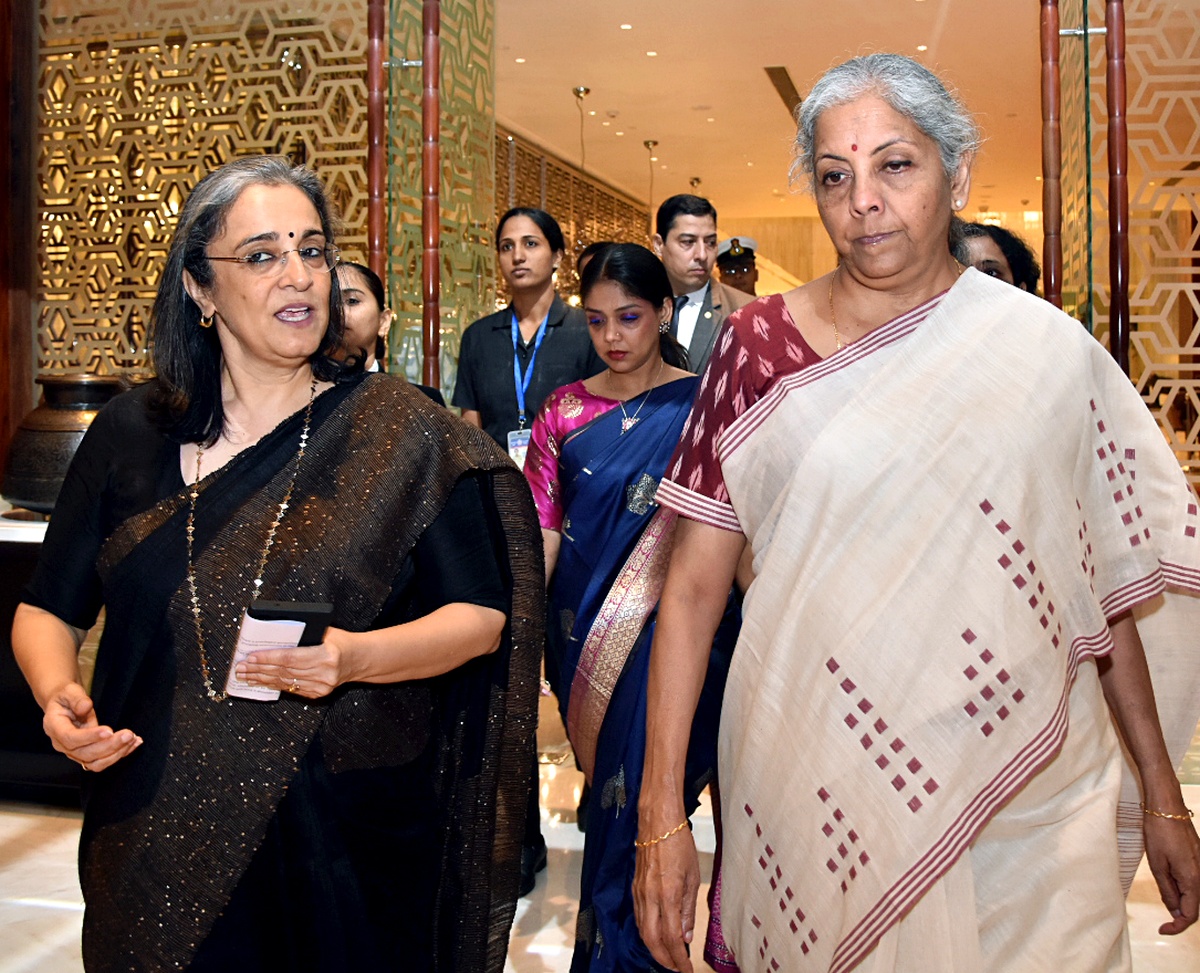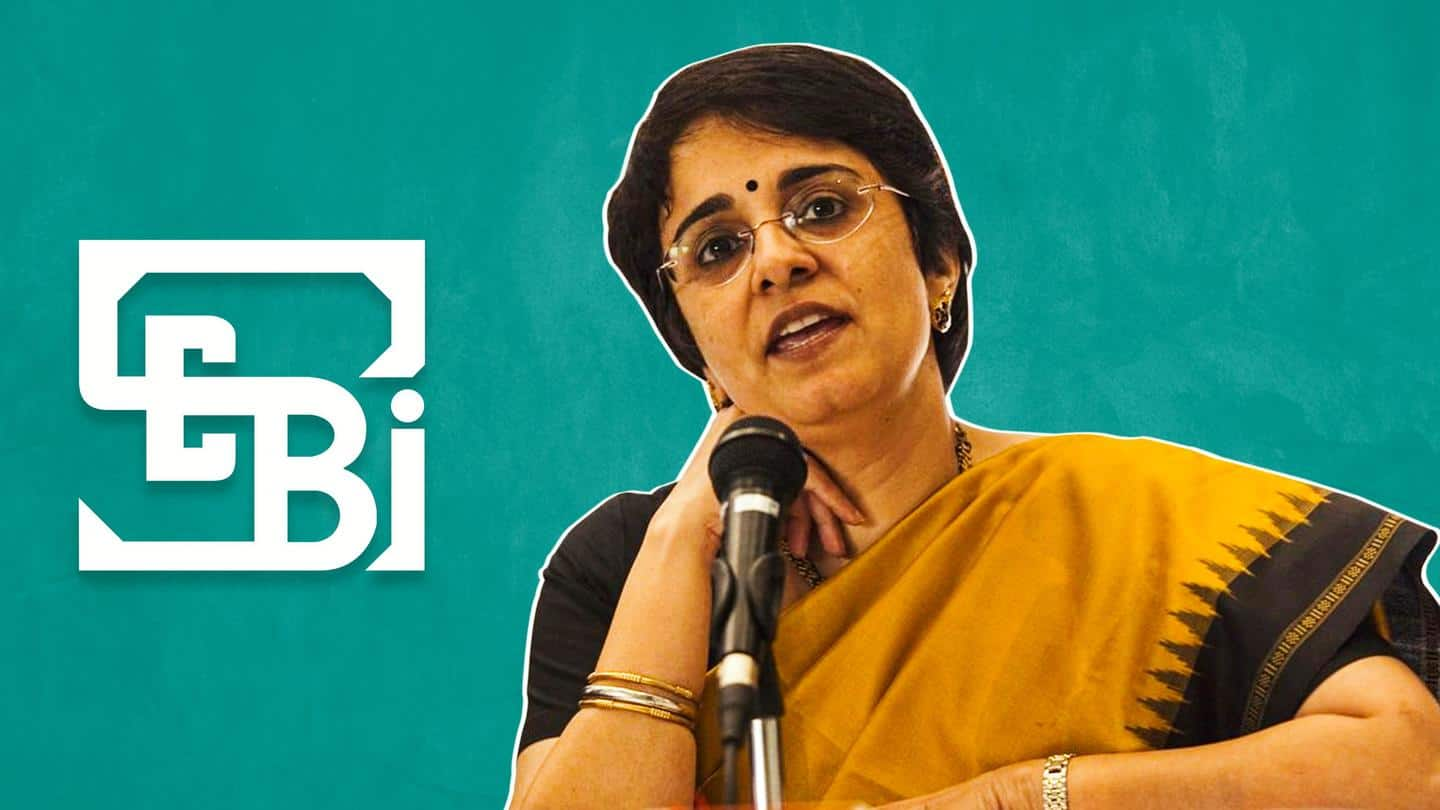Nirmala Sitharaman Backs The Buch’s With “Facts Need To Be Taken On Board”; Why It is High Time The Buch Must Stop Here?
The integrity of India’s financial markets is under scrutiny following serious allegations against SEBI Chairperson, Madhabi Puri Buch, raised by US-based activist-investor Hindenburg Research. The report, which accuses Buch of a conflict of interest involving offshore funds linked to the Adani Group, has cast doubt over the credibility of SEBI, India’s apex market regulator. At a time when global investor confidence is vital for India's economic ambitions, these allegations risk not only tarnishing the reputation of the regulator but also unsettling the stability of the country’s financial markets. Given SEBI's central role in upholding transparency and accountability, the public deserves clear and forthright answers, especially from the person at its helm. However, at the moment offering an umbrella FM said that Buch, along with her husband, had answered quite a few of the allegations levelled against her by the Congress party and had put forth the facts.

Union Finance Minister Nirmala Sitharaman, speaking at an event on Monday, spoke on the ongoing controversy surrounding the chairperson of SEBI, Madhabi Puri Buch.
Sitharaman emphasized the importance of considering facts in light of the allegations levelled against Buch by the Congress party and supported the stance that Buch and her husband, Dhaval Buch, have taken in defending themselves.
“Quite a few of the allegations are being answered by her and by her husband. Both of them together are defending themselves and putting facts to contradict those which have been alleged by the Congress. So, the facts will have to be taken on board,” Sitharaman said, stressing that the accusations must be evaluated based on evidence rather than speculation.
Offering An Umbrella
The controversy began when the US-based short-seller Hindenburg Research released a report in early August accusing Buch of a conflict of interest.
These claims focus on her ties to a Mauritius fund that is under SEBI’s scrutiny for its involvement in fund flows into Adani Group companies between 2016-17.
The fund, which reportedly moved money through a structure linked to Vinod Adani—brother of Gautam Adani—raises concerns due to Buch’s reported stake in the same fund structure during the period SEBI is investigating (2015-2018).
Both Madhabi and Dhaval Buch have publicly refuted these allegations in a detailed six-page letter dated September 13. This marks their second significant response since the initial allegations surfaced.
The Buchs categorically denied any conflict of interest, corruption, or lack of transparency, particularly regarding their consultancy firm, Agora Advisory, and its relationship with Buch’s former employer, the ICICI Group, and other corporate entities.
Sitharaman refrained from passing judgment on the Buchs’ rebuttal, stating, “I am not here to judge (their answers),” a comment indicating that the issue is far from being resolved in the public eye.

Why the Buch Controversy Must Not Be Overlooked
The ongoing controversy involving SEBI chairperson Madhabi Puri Buch is not just a matter of bureaucratic ethics but poses significant challenges to India’s regulatory and financial ecosystem.
The allegations from Hindenburg Research claim that Buch had investments in an offshore Mauritius fund implicated in SEBI’s investigation into fund flows tied to the Adani Group.
This claim, if substantiated, places Buch in a precarious position, given that her own tenure at SEBI overlaps with the time when these investments were reportedly made.
Why the Buch Controversy Needs Immediate Resolution
The allegations levelled by US-based activist-investor Hindenburg Research against Madhabi Puri Buch, the current chairperson of SEBI (Securities and Exchange Board of India), are both deeply troubling and highly complex.
Hindenburg’s report accuses Buch of investing in an offshore Mauritius fund, which is part of the same fund structure currently being investigated by SEBI for funneling money into Adani Group companies between 2016-17.
The controversy arises because companies owned by Vinod Adani, Gautam Adani’s elder brother, allegedly used this fund structure to move money into the Indian stock market, raising significant concerns.
What’s particularly problematic is the timeline: the period during which SEBI is probing the fund’s involvement (2016-17) overlaps with the years Madhabi Puri Buch reportedly held a stake in the very same fund (2015-2018).
This presents a glaring conflict of interest, and given SEBI’s mandate to regulate the capital markets, such allegations cast a shadow over the credibility of the regulator itself.
This situation bears a haunting resemblance to the infamous Satyam scam of 2009. Back then, the revelation of massive accounting fraud by Satyam’s chairman, Ramalinga Raju, stunned India’s corporate world.
Raju’s resignation letter confessed to inflating profits for years, likening his experience to “riding a tiger, not knowing how to get off without being eaten.”
The scandal triggered panic in the stock market, and SEBI’s then-chairman, C.B. Bhave, faced tremendous pressure to restore investor confidence.
Bhave took swift action, coordinating with the Ministry of Corporate Affairs and pushing for reforms, including stricter regulations on insider trading and fraudulent activities.
In the current scenario, the question is- where do SEBI’s investigations into the Adani Group, prompted by Hindenburg’s accusations of stock manipulation and accounting fraud, stand?
SEBI claims to have completed 23 out of 24 investigations, but the process has dragged on for months, sparking concerns about the regulator’s efficiency.
Earlier this year, India’s Supreme Court ruled that the Adani Group need not face additional probes beyond SEBI’s scrutiny.
If so much trust is placed in SEBI’s capabilities, why has the investigation taken this long?
The Adani Group, with a market capitalization exceeding $40 billion and a substantial base of retail investors, warrants a thorough and swift investigation.
If any lessons have been learnt, the importance of protecting investor interests and the need for regulatory vigilance is most vital.
Adding urgency to this issue is Adani Enterprises’ upcoming $1 billion share sale, planned for mid-September, following the halt of its earlier $2.5 billion offering in the wake of Hindenburg’s allegations.
Adani Energy has already raised $1 billion from US investors and sovereign wealth funds. From a regulatory perspective, it would be prudent for SEBI to resolve these lingering allegations before more money is raised from investors—both foreign and domestic.
After all, mutual funds in India have invested over ₹41,000 crore in Adani Group companies, a significant sum that impacts the financial well-being of countless retail investors.

The Buch Should Stop Here
If SEBI is to maintain its reputation as a strong, impartial regulator, it must ensure a transparent and efficient resolution of these allegations. The stakes are too high for delays, and the integrity of India’s capital markets depends on decisive action.
The second issue at hand is one of reputation.
In response to Hindenburg’s report, the Adani Group argued that it was an attempt to destabilize the company and, more significantly, to discredit India’s governance practices. While the rapid growth of the Adani Group since 2014 may raise eyebrows, it is crucial to remember that no single conglomerate represents India.
That role falls to institutions like SEBI, which are responsible for setting and enforcing the rules that govern India’s financial markets. These institutions are expected to take decisive action when rules are broken.
The allegations of a serious conflict of interest involving the head of India’s market regulator, Madhabi Puri Buch, are not just harmful—they are dangerous for the country’s financial reputation.
The sooner this issue is addressed transparently and unequivocally, the better.
In the first half of August, foreign portfolio outflows amounted to nearly ₹20,000 crore. This sharply contrasts with the previous two months, during which the Indian market experienced inflows of over ₹58,000 crore.
While some of these outflows can be attributed to global market fluctuations, there’s a clear correlation between Hindenburg’s report, which implicated Buch’s ties to offshore funds linked to the Adani Group, and the sharp decline in foreign investment.
For three consecutive days after the report’s release, foreign institutional investors sold off their holdings.
If India aims to position itself as a prime destination for foreign investment, these allegations must be addressed swiftly and transparently.
When investors suspect corporate cronyism, they become cautious. But when accusations of regulatory misconduct emerge, large-scale investment managers see it as a systemic threat, risking the funds they manage.
The Indian stock market is currently enjoying a remarkable run, with high levels of interest from global investors. The finance ministry must seize this moment to tackle the crisis head-on.
If Hindenburg’s accusations are left unaddressed, it will be much harder to convince investors to stay when global markets turn uncertain and India’s investment outlook shifts from optimistic to wary.

Saving The Reputation
The most pressing concern, however, is the integrity of the regulatory role itself. Following Hindenburg’s report, Buch and her husband issued a statement explaining the nature of their investments.
Unfortunately, this response falls short. As a seasoned professional in the financial industry, Buch is undoubtedly aware of the delicate nature of reputations in such a high-stakes environment.
While individuals have the right to make personal investment decisions, the head of India’s regulatory body for securities and commodities must be held to the highest standards of propriety. In this role, Buch, like anyone else in her position, must be above suspicion.
If there is no merit to the allegations made in the Hindenburg report, then why not take immediate steps to clarify the situation?
SEBI’s chairperson could make her conflict of interest disclosures public, hold an open press conference, and address the two critical questions-
1) Did Madhabi Puri Buch disclose her ties to the fund linked to the Adani Group?
2) And if so, did she recuse herself from SEBI’s investigation into the Adani Group?
If, as Buch claims, these allegations are merely an attempt at “character assassination,” why stop at issuing a “show-cause” notice? She should pursue legal action to clear her name.
Even the Adani Group had considered legal action at one point, which Hindenburg welcomed. Yet, neither the corporation nor SEBI’s chief seem eager to take that step.
There is a dark irony in these allegations. Buch, a career banker, began her journey at ICICI Bank and later went on to lead ICICI Securities. The memory of another ICICI veteran, Chanda Kochhar, is still fresh.
Kochhar, the former managing director and CEO of ICICI Bank, along with her husband, Deepak Kochhar, faces accusations of sanctioning loans to the Videocon Group in exchange for personal favors.
The financial world was also rocked by revelations of misconduct involving Chitra Ramkrishna, the former MD and CEO of the National Stock Exchange (NSE).
Ramkrishna allegedly took guidance from a mysterious “Himalayan yogi” to make critical decisions about the stock exchange, sharing sensitive information with this unknown figure.
These cases were shocking, especially because the financial industry, particularly equity markets, is largely seen as a “boys’ club.”
In such a context, each leadership position attained by women in the sector was a significant win, and their success was inspiring.
Now, as SEBI’s chairperson and the central figure in India’s equity market regulation, Buch must lead by example and prove that her actions are beyond reproach and untainted by any financial misconduct.
At a business channel conference in July, when asked by an audience member about declining bank deposits and the rise in mutual fund investments, Buch responded with a laugh, saying, “You’ve asked me an out-of-syllabus question.”
However, the questions raised by Hindenburg are very much within her domain. With 45 million mutual fund investors placing their trust in SEBI, Buch must answer these questions transparently and demonstrate that she has adhered to all ethical and regulatory guidelines.
The Last Bit, As the head of India’s most crucial financial regulatory body, Madhabi Puri Buch is herself at the center of a storm that threatens both her reputation and the credibility of the institution she leads.
Transparency, swift action, and accountability are paramount in addressing the concerns raised by Hindenburg’s allegations and if Buch and SEBI are to restore faith in India’s financial governance, they must act decisively, offering clarity not only to the Indian public but also to global investors.
In a world where perception can quickly become a reality, the onus lies on Buch to prove that SEBI works with integrity in India’s rapidly evolving financial sector.





